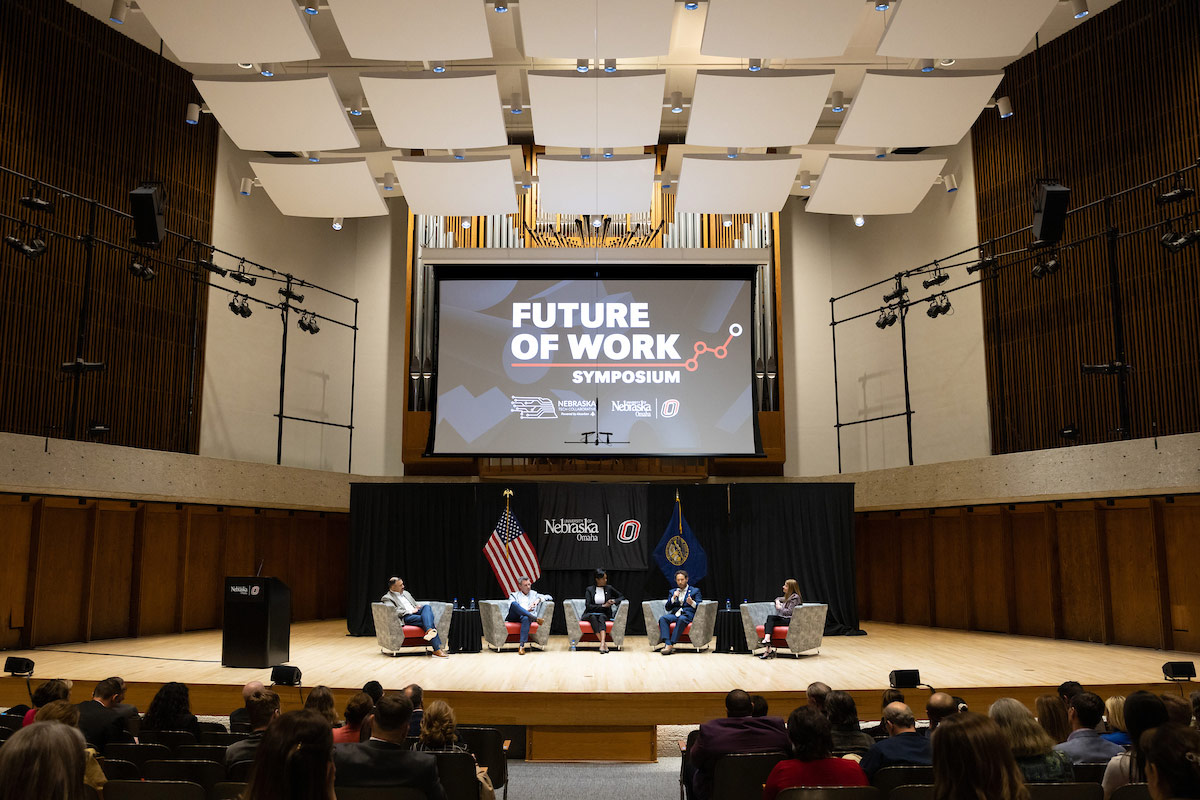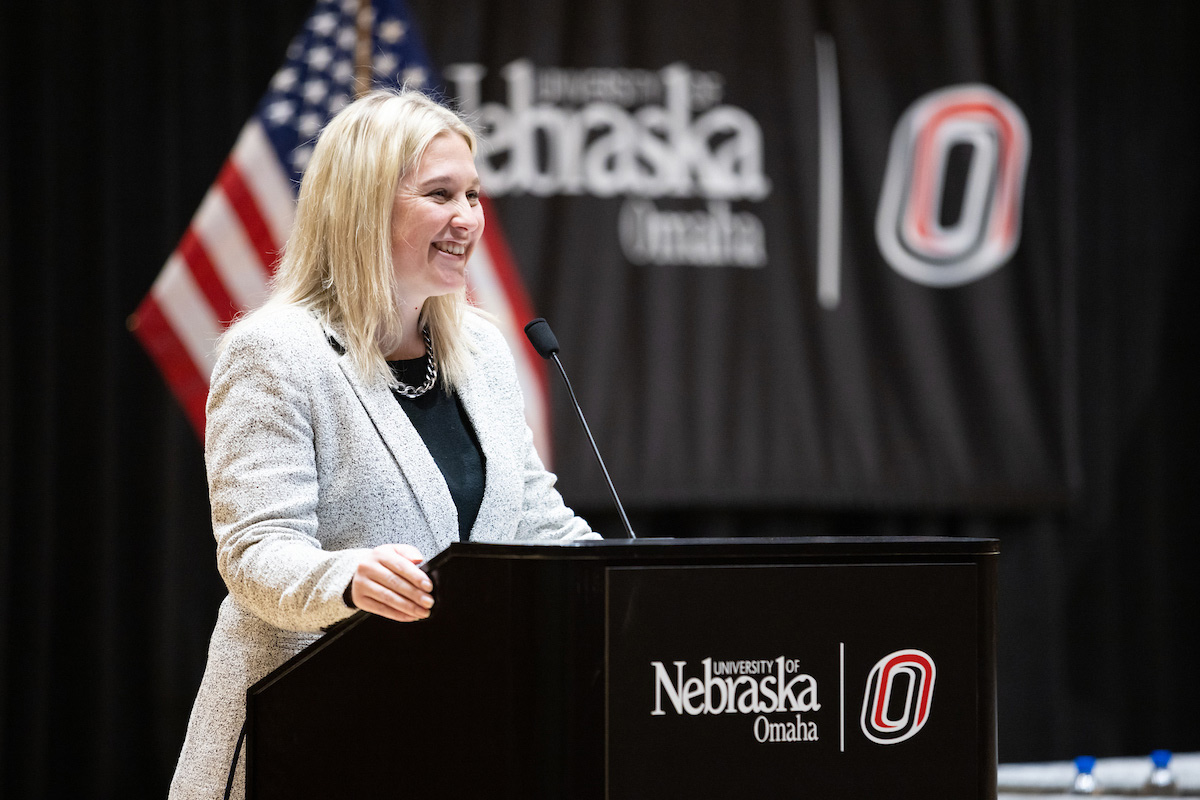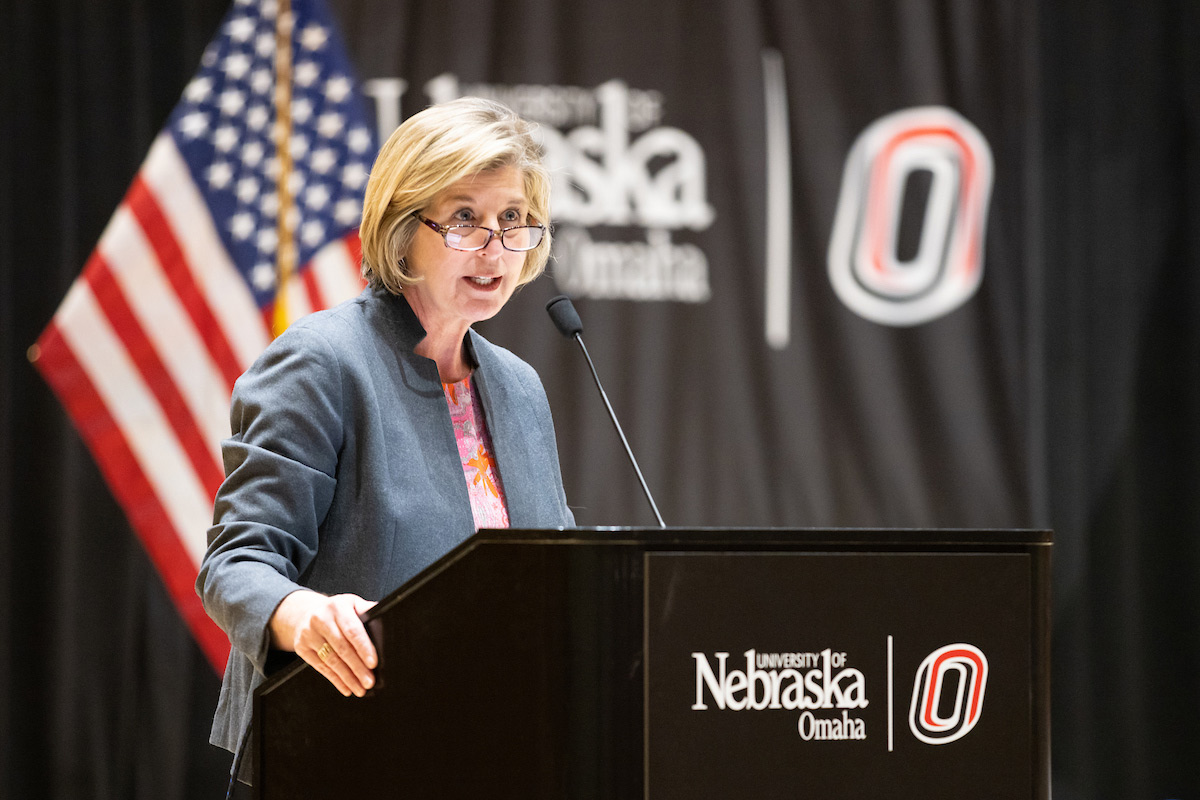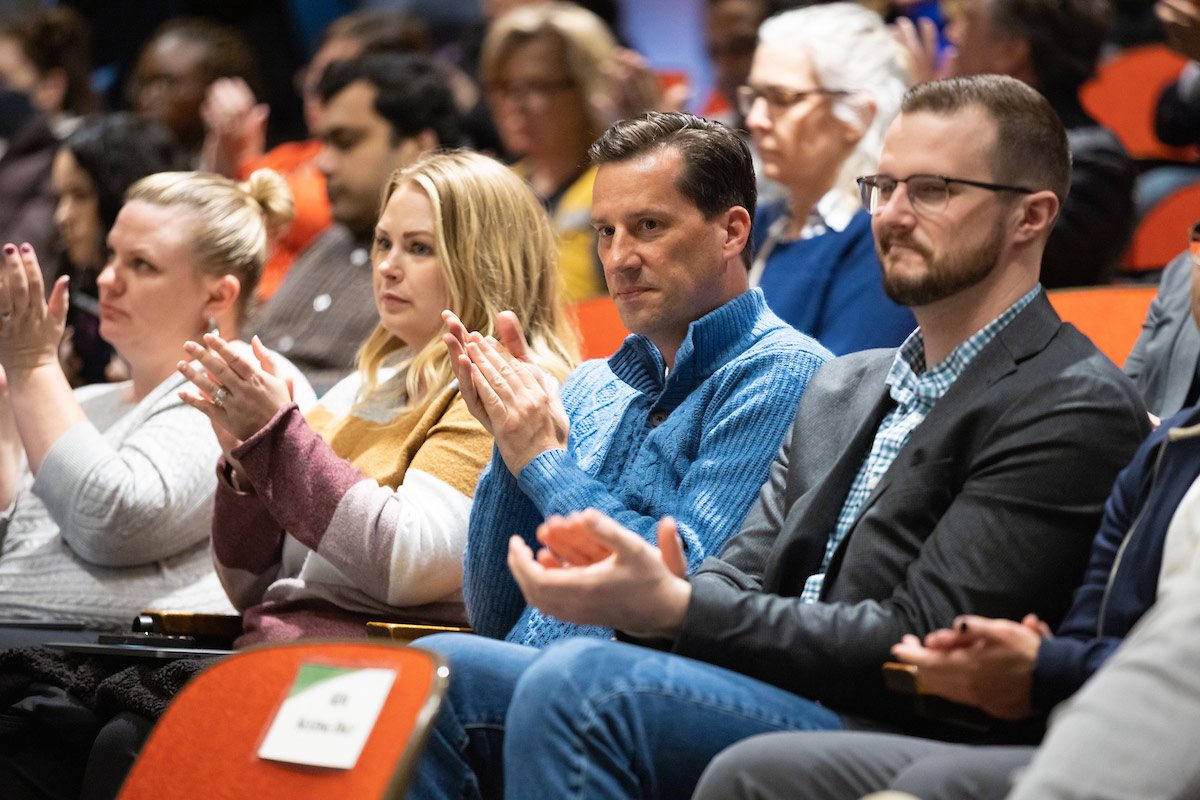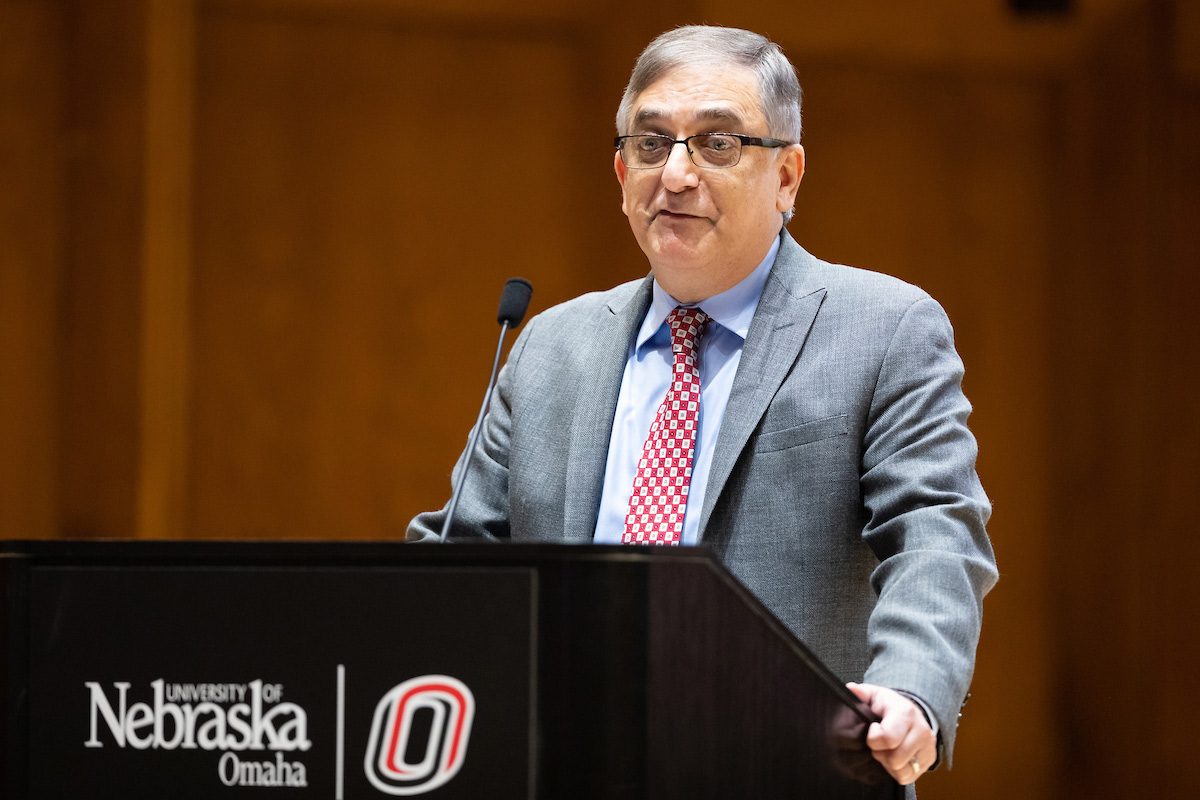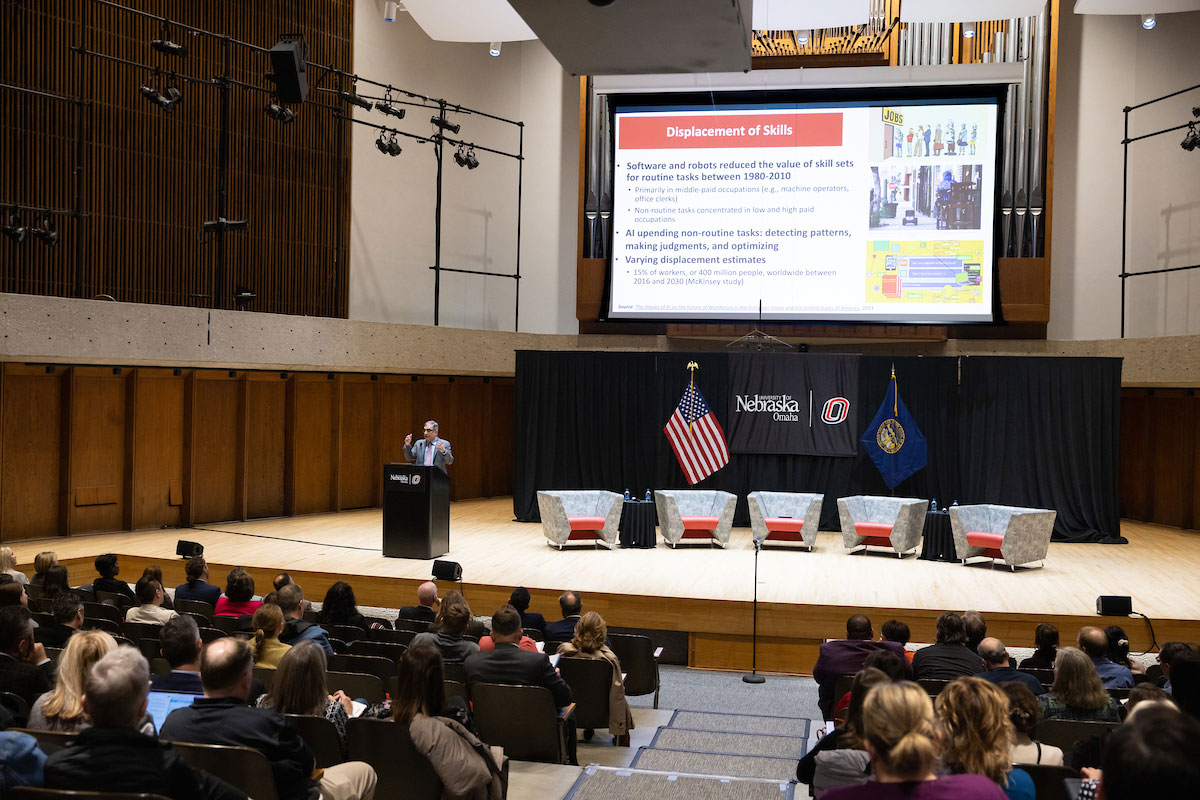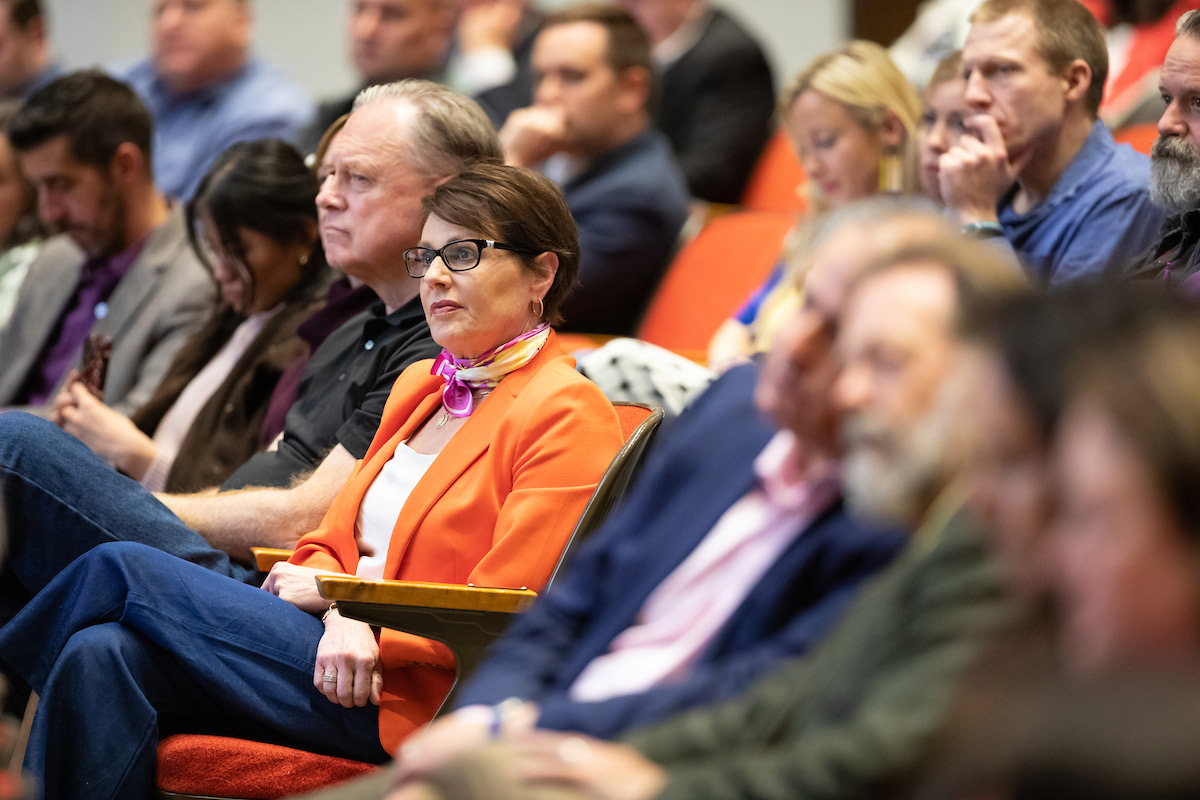Artificial Intelligence is Advancing; ‘Future of Work’ Panel Discusses How the Workplace Can Keep Pace
- published: 2023/04/24
- contact: Brandon Bartling, Sam Peshek - Office of Strategic Marketing and Communications
- email: unonews@unomaha.edu
- search keywords:
- Future of Work
- artificial intelligence
- automation
The second iteration of UNO’s Future of Work Symposium Series focused on the rise of chatbots and artificial intelligence (AI), its growing role in society and the workplace, and the opportunities and threats facing the use of AI and automation. Hundreds gathered in the John and Jan Christensen Concert Hall inside the Strauss Performing Arts Center on Friday to hear what leading experts and professionals are taking into consideration when implementing and managing AI in their workplaces.
Michelle Trawick, Ph.D., dean of UNO’s College of Business Administration welcomed Arun Rai, Ph.D., professor, director, and co-founder of the Robinson College of Business Center for Digital Innovation at the University System of Georgia, as the keynote speaker for the event.
AI and Automation, Augmentation, and Creation
Rai spoke to how artificial intelligence can impact the workforce through automation, or displacing human skills; augmentation, or using AI to complement skills; and creation, or developing new human skills and jobs to utilize AI.
In his remarks, Rai also discussed the importance of transparency, fairness, and ethical uses of AI. One of the emerging AI chatbot platforms, known as ChatGPT created by OpenAI, now utilizes 1 trillion parameters as part of its learning to operate. Within these parameters can be useful information to guide the algorithms, but also disinformation in addition to biased and discriminatory information. Algorithms use this information to make predictions based on data to build responses, using probabilities to determine what information should come next.
All of this leads not only to workforce needs, but opportunities for companies and organizations. Utilizing AI requires adapting to meet new needs. “We are at this point in research where we’re looking at AI exposure in the industry,” Rai said. “We’re looking at AI for different occupations and jobs, but distilling it down to skills, and these models fundamentally need to be dynamic. Because AI is not stagnant, labor markets are not stagnant.”
Rai pointed out two key aspects that became recurring themes in his remarks and in the following panel discussion.
First, AI does not have to always replace, but can be used as a tool to work smarter and reduce disparities. Currently the largest tech companies are the biggest producers of AI content and workflows. The broad availability of AI platforms enable more people at lower skill levels to utilize AI in their own occupations and workplaces. This point essentially boils down to the importance of adapting to new technology. A quote shared by Rai stated, “AI will not replace managers, but managers that use AI will replace those that do not.”
Second, the true potential of implementing AI in the future of the workplace lies at the intersection of AI and other fields. Lawyers may use AI to synthesize massive amounts of legal data. Legislators and decision makers can use AI to influence public policy. The possibilities are truly endless.
Panelists Discuss AI in Their Industries
Following Rai’s remarks, a panel comprised of researchers and leaders from area businesses and organizations took to the stage to engage in a Q&A session featuring questions from the audience. The panel was moderated by Shonna Dorsey, executive director of the Nebraska Tech Collaborative, and included:
- Javier Fernandez, president & CEO, Omaha Public Power District
- Todd Murphy, president, Truescope North America
- Joel Elson, Ph.D., assistant professor, UNO’s School of Interdisciplinary Informatics
- Marina Brown, founder and CEO, Moneiva
Panelists spoke to how the emergence of automation and artificial intelligence would directly impact their industries, and how their fields have managed the introduction of previously disruptive technologies. Audience members could also answer the questions by scanning a QR code and providing their own responses.
Fernandez said he has seen an exponential increase in electricity use in recent years as a result of artificial intelligence and automation, jumping from four megawatts per year to 100 megawatts per year. He expects that total to double by the end of the decade.
“The majority of that growth is coming to us because of the data centers, whether they are big data centers around the region or data in servers or people’s computers,” he said. “Data is altering our industry because we have to power the AI, and that AI doesn’t work without electricity.”
Brown said the field of logistics has been transformed by advances in automation.
“If you think of a logistics operator or a logistics manager from 20 years ago to now, that person was probably sitting with their team and were spending a majority of their time trying to find the right data so they can make one or two decisions per day,” she said. “Today, that same team is spending very little time on finding the data because all that data is readily available to them, and they’re rapidly making decisions.”
True to the forum’s name, the panelists discussed what AI and automation means for their workforce. Could these evolving technologies exacerbate a workforce crisis where there aren’t nearly enough positions to go around? Or would these advances lead to changes in roles or new positions that previously never existed?
Elson, who leads information science and technology research initiatives for NCITE, said that while there are many workforce benefits that come with AI, there are just as many risks to consider.
“This is leading to some potential concerns around the novelty of new attacks – new attack types that we’ve never conceived of and are having difficulty anticipating, and the essential need to train individuals at entry level,” he said.
Although the technologies are powerful and impressive on their own, Murphy said, they will only be as impactful as the people who use them allow them to be.
“If we don’t recognize that human nature will control how we use it, we’re not going to adapt. We’re not going to harness it. We’re not going to profit from it,” he said.
The Future of Work Symposium Series at UNO began in fall 2022 as a series of ongoing conversations discussing critical topics influencing how, why, and where we work. Through conversations with leaders from the public, private, nonprofit, and education sectors, this series will continue to shed light on big challenges facing the workplace and share through-provoking insights on the future of the workforce.
Information about upcoming events in the Future of Work Symposium Series will be published on the UNO website as it becomes available.
